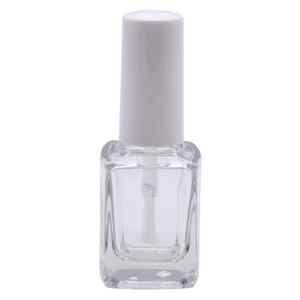When your makeup brushes are dry, I’d highly recommend you to put them for 5 minutes in a UV-C LED light container to kill germs and bacteria. Many makeup artists use Brushean, a smart beauty tech product that will bring your makeup tools safer for your clients.
How to clean your makeup brushes
To protect your skin and kill any harmful bacteria that lingers in your makeup brushes, it’s a good idea to wash your brushes every 7 to 10 days. To clean your makeup brushes, follow these tips from board-certified dermatologists.
Dirty makeup brushes can wreak havoc on the skin. In addition to collecting product residue, dirt and oil, makeup brushes are a breeding ground for bacteria. This could compromise your complexion — in the form of acne breakouts and rashes — as well as your health. Dirty makeup brushes can cause an infection, such as a fungal infection, E. coli, or a staph infection, which can be very serious.
To protect your skin and kill any harmful bacteria that lingers in your makeup brushes, it’s a good idea to wash your brushes every 7 to 10 days.
To clean your makeup brushes, dermatologists recommend the following tips:
- Rinse the tips of your brushes under lukewarm, running water to remove residual makeup. Only rinse the tip, as submerging the whole brush head will eventually dissolve the glue that connects the brush head to the handle.
- Fill a bowl with lukewarm water and a tablespoon of either gentle shampoo or clarifying shampoo. Using plain soap and water can dry out the bristles.
- Swirl each brush tip in the bowl. For a good lather, you can also massage each brush tip in the palm of your hand.
- Rinse the brush tips under running water.
- Continue shampooing and rinsing each brush until the water runs clear from the brush.
- Squeeze out excess moisture with a clean, dry paper towel.
- Lay your brushes flat to dry on a towel with the tips hanging off the edge of the counter. Do not dry your brushes upright in a container, as this will cause the water to run down the brushes, loosening the glue that connects the brush head with the handle.
At a time when skin infections are on the rise, never share your makeup brushes with anyone else, and wash them often.
If you suspect that your makeup is causing acne breakouts or other skin irritation, make an appointment to see a board-certified dermatologist.
- About AAD
- Contact AAD
- Donate
- Employment
- Store
- Support AAD
- Website feedback
- AAD meetings & events
- Advertise
- Classifieds
- Licensing
- Mailing lists
- Meeting advertising
- Legal notice
- Corporate partners
- Donors
- Exhibitors: 2024 Annual Meeting
- Media
- International
- For AAD members
- Patient advocates
- Diseases & conditions
- Everyday care
- Cosmetic treatments
- Public health programs
- Find a dermatologist
Reproduction or republication strictly prohibited
without prior written permission.
How often should you clean your makeup brushes?

The frequency of disinfecting your makeup brushes depends on how often you use them and how many people you use them on.
Generally, dermatologists and estheticians recommend cleaning your makeup brushes after every use. Anyway, if your makeup brushes are just for personal use, cleaning them once a week should be enough.
On the other hand, if you work as a makeup artist and you have more clients in a day, a best practice would be to clean your brushes after every client with a spray, and disinfect them every evening to be ready for the next day.
Never skip cleaning days
If you ever think about skipping the cleaning process for your makeup brushes, then you’re making a huge mistake. And it doesn’t affect only you, but also your makeup clients.
Not washing your brushes regularly or not disinfecting them after every single use can cause dangerous infections and acne.
Dirty makeup brushes harbor a lot of bacteria collected from people’s skin, so disinfecting them properly is just as important as doing it on a regular basis.
What diseases can you get from sharing makeup or using unsterilized brushes?

The most common disease out there is staphylococcus aureus, a germ that can cause painful skin infections. According to dermatologist Jeanine B. Downie, “sharing cosmetics, especially mascara, eyeshadow, and eyeliner, can lead to a bad eye infection.” That’s why you should buy one-time-use brushes if possible, or use an external brush (and not the one that comes with the product) that you can disinfect after every use.
What to Clean Makeup Brushes With
There are a couple of common household products you can use to clean your makeup brushes. Some of them include:
- Liquid dish soap. Liquid dish soap can efficiently remove makeup product residue that has already caked. Apply some dish soap to a sponge and wipe your brushes on the soapy sponge. Rinse the brush with lukewarm water, wipe it down with a towel, and then leave it flat to dry.
- Vinegar and lemon. A combination of vinegar and lemon makes a great disinfectant. It goes a long way in killing germs and leaving your brushes with a pleasant smell after cleaning. To clean with this combination, put two tablespoons of white vinegar in a cup of hot water. Wash the tip of your brush in the mixture and then rinse with lukewarm water. Then, cut a lemon open and run the brush against it to remove the smell of vinegar. Apple cider vinegar may also serve as a great option to use with lemon.
- Baby shampoo. Baby shampoo does a great job of cleaning makeup brushes. It’s also gentle on the bristles. Pour a drop of baby shampoo into some lukewarm water and swirl with your makeup brushes. Massage the bristles with your fingers. Then, rinse the brush with water and leave it flat to dry.
How Often Should You Clean Your Makeup Brushes?
How often you should clean your makeup brushes depends on the type of makeup you use. If you are using a brush to apply wet products or makeup with liquid components (like the concealer and foundation), you may need to clean it more often. Try washing this brush at least once a week. This may be enough to get rid of the product. It may also make the brushwork efficient and effective.
When it comes to the brushes you use around your eyes, you should clean them after every two weeks. This also goes for brushes you use to apply dry makeup products (like eyeshadow and eyeliner). The reason for this is that your eyes are more likely to get infections than your skin.
The brushes that you use to apply dry products like powder on your skin only require one wash per month.
Remember to also pay attention to other things like sponges that you may be using with liquid products. Like any other sponge, they soak up moisture and makeup. If you don’t keep the sponge clean, it may promote the growth of yeast and bacteria on your skin. Most makeup manufacturers make them with preservatives that prevent this from happening; however, if makeup builds up for some months, you may get an infection if you get a cut on your skin.
Conclusion
Using a dirty makeup brush may give you skin infections, allergic reactions, and acne, things that are preventable with a simple wash every now and then. Avoid sharing makeup brushes with other people and wash the ones you use often. If you are experiencing skin reactions or infections and think that your brush might be the cause, consider seeking professional help. Check out a certified dermatologist (skin doctor).
If you notice that your brushes have become worn out or that they’ve lost their shape, consider disposing of them and getting new ones. It may not be worth it to keep them around if they won’t function efficiently.




